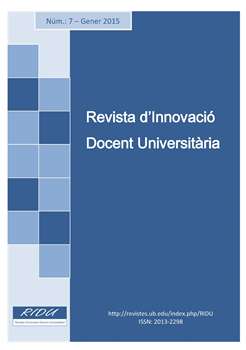TFC: End of Studies Tutorial (stands for Catalan "Tutoria de Final de Carrera)
DOI:
https://doi.org/10.1344/RIDU2015.7.3Keywords:
Tutorial, Curriculum, Competence.Abstract
This paper presents the author’s experience as a tutor of Chemical Engineering degree students at the University of Barcelona. It presents a tool called TFC (standing for “Tutoria de Final de Carrera” in Catalan; end of studies tutorial) aimed at helping the student, in a practical and realistic way, in the last stages of their studies and in the afterwards.
The aim of this activity is to reduce the students’ doubts in a moment where important decisions for their professional and personal future need to be taken. It also aims at enhancing their self-esteem, giving them accurate information on master studies and professional world, helping them at evaluating their own aptitudes and capacities and, finally, enhancing their confidence.
In this activity the students take part in a group session, followed by an individual interview with the aims mentioned before. The “competence based curriculum” is highlighted as an example of the students’ progress. This activity results in an increase of students’ satisfaction and self-esteem, a more effective approach to the transition into the professional world and more self-confidence for the students.
References
[1] Bartolomé, A. R. (1994) Recursos tecnològics per a la docència universitària. Publicacions Universitat de Barcelona, Barcelona.
[2] Bartolomé, A. R. (1999) Nuevas tecnologías en el aula. Guía de supervivencia. Graó - ICE de la Universitat de Barcelona, Barcelona.
[3] Benedito, V., Ferrer, V., Ferreres, V. (1995) La formación universitaria a debate. Publicacions Universitat de Barcelona, Barcelona.
[4] Costa, J., Mans, C. (1974) Relaciones entre Departamento Universitario e Industria Química. Ingeniería Química, maig, pp. 142-146.
[5] European Federation of Chemical Engineering - Working Party on Chemical Engineering Education (2005) EFCE Recommendations for Chemical Engineering Education in a Bologna Two Cycle Degree System. A la web http://www.efce.info/Bologna_Recommendations.html
[6] Mans, C. (dir.) (2006) Guia per al disseny d’un perfil de formació: Enginyeria Química. Agència per a la Qualitat del Sistema Universitari de Catalunya, Barcelona.
[7] Mans, C. (2004) Disseny de processos de formació: Enginyeria Química. En: El disseny de processos de formació, pp. 49-63. Agència per a la Qualitat del Sistema, Universitari de Catalunya, Barcelona.
[8] Pagès, J. (1995) La formació universitària dels tècnics a Catalunya. Discurs inaugural del curs 1995-96 de l’Institut d’estudis Catalans.
[9] Rodríguez, S., Rotger, J. M., Martínez, F. (eds.) (1996) Formación y Desarrollo para la Docencia y Gestión Universitaria. Cedecs, Barcelona.
[10] Rodríguez, S. (coord.) (2004) Manual de Tutoría Universitaria. Octaedro/ICE-UB, Barcelona.
[11] Universitat de Barcelona (2004) Document marc sobre la tutoria a la Universitat de Barcelona. Recursos d’Informació per a la docència (RIDOC). http://hdl.handle.net/2445/1121
Downloads
Published
Issue
Section
License
Authors whishing to publish in this journal agree to the following conditions:
- The author or author retain copyright and grants the journal the right of first publication of the paper.
- The texts will be published under license "Reconocimiento Creative Commons 4.0 España", which allows to share, distribute, reproduce and the public communication of the paper, as long as the name of the author or authors and the journal are clearly stated.







